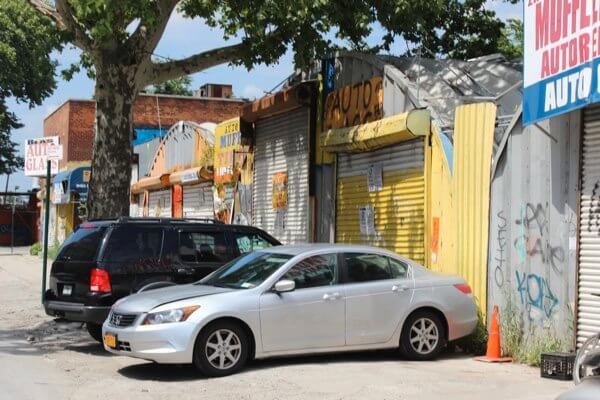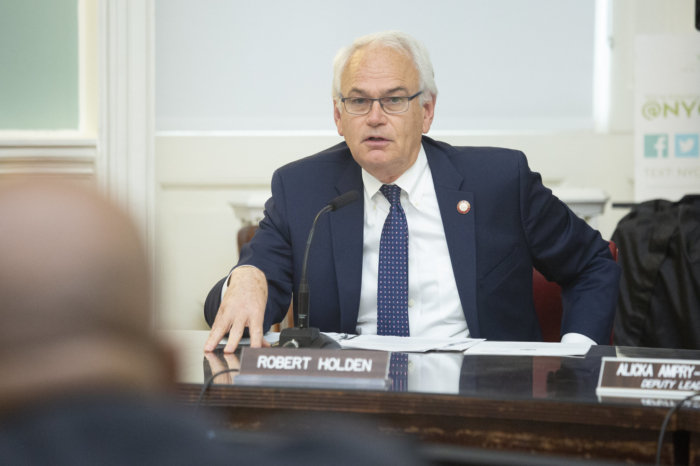By Gina Martinez
The future of Willets West is once again unclear.
In a victory for state Sen. Tony Avella (D-Bayside), the New York Court of Appeals blocked the development of a proposed megamall project near Citi Field, ruling that the developers needed approval from the state Legislature before moving on with the project to be built on parkland.
Queens Development Group has been fighting to build a proposed megamall and movie theater on the 30-acre site where Shea Stadium once stood. The lawsuit, filed in Manhattan Supreme Court in February 2014 by Avella, along with the City Club of New York, Queens Civic Congress, members of Willets Point United and nearby residents and business owners, challenged the transfer of Queens parkland worth about $1 billion.
The lawsuit focused on the proper use of the land. The megamall was slated to be built on the parking lot east of Citi Field, which is technically still parkland belonging to Flushing Meadows Corona Park and under lease to the New York Mets. Arguments centered around a 1961 law allowing the construction of Shea Stadium in Flushing Meadows Park.
In a 5-1 decision, the court decided that the developers needed consent from state legislators before moving forward.
“There is no dispute that the Willets West development is proposed to be constructed entirely on city parkland,” Judge Rowan Wilson said. “The public trust doctrine is ancient and firmly established in our precedent.
His opinion went on to say, “Only the state Legislature has the power to alienate parkland (or other lands held in the public trust) for purposes other than those for which they have been designated.”
Alienating parkland must be “plainly conferred” through the “direct and specific approval of the state legislature,” he ruled.
Willets Point is currently home to auto shops, unpaved roads and scrap yards. Current development plans include a contractual escape clause that does not guarantee affordable housing — a key component of the original plan, according to the East Elmhurst Corona Alliance civic group. It has been protesting for the last few months and called the mega-mall development plan a “desperate land grab” that doesn’t benefit the neighborhood and only profits the developers.
Regardless of what is done, Queens Borough President Melinda Katz wants to focus on the future of the site. She has emphasised the need for affordable housing and has suggested a soccer or hockey stadium to attract more visitors and boost the economy.
“We look forward to working together with the current administration and the community on identifying what’s in the best interest of the borough, and on an aggressive time line to clean up the area and its nearby waterways,” she said in a statement. “Willets Point redevelopment must meet the city’s critical needs and ever-growing demand, as was promised long ago.”
A spokeswoman for City Hall said the mayor also wants to move forward to rejuvenate the blighted site.
“Our priorities remain the same: Jump-starting the affordable housing, schools, libraries, retail and open space this community was promised,” she said in a statement. “This ruling does not alter the city’s ability to move ahead with a dynamic mixed-use project on Willets East. We’ll determine the best path forward with stakeholders in the coming weeks.”
The Queens Development Group, which includes the Wilpon family — owners of the Mets — said it was unhappy with the court’s ruling. The group said the decision will further delay a project that would have reversed 100 years of pollution, create thousands of good-paying jobs and turn vacant lots into a vibrant community.
“At a time when Queens needs private investment more than ever, the court’s decision disregards the City Council, the local community board and other stakeholders who have already approved the Willets West plan. We are in the process of evaluating our next steps,” the group spokesman said.
The megamall project was added to the Bloomberg adminstration’s initial $3 billion redevelopment plan and the affordable housing component was pushed back to 2025 after the City Council had greenlighted what turned out to be the first draft.
Avella, the lead plaintiff in the case, celebrated the decision. He said the 30 acres were always intended to be used as parkland, not for the development of a megamall.
“Today’s decision was a resounding victory for the public trust doctrine and residents across New York state,” Avella said in a statement. “In a city where public land is in short supply, simply handing over parkland would be an absolute disgrace and a betrayal of the public trust. This victory sets a precedent for decades to come that our government cannot give away our parkland or be complicit in a developer’s heist of public land.”
Another plaintiff, an advocacy group called City Club of New York, said it brought this action to prevent other public parks and places from being treated as “dumping grounds.”
“The city was clearly cutting procedural corners in attempting to bypass the state Legislature,” City Club President Michael Gruen said. “We objected to the implication that the ends justify the means. We successfully fought it here. We hope that we will not have to fight it again, but we do not intend to stand by if and when the issue arises again.”
Reach Gina Martinez by e-mail at gmart






































